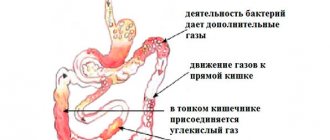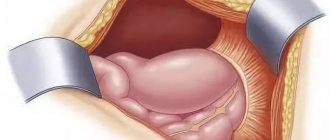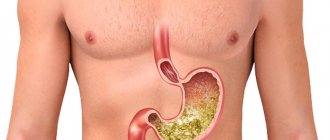Severe gas and diarrhea in an adult
Patients are always interested in what can provoke severe gas and diarrhea, because they often appear.
The appearance of a pathological condition is quite often observed against the background of food allergies. This is explained by the process of the immune system rejecting certain foods that contain proteins. Also, severe gas and diarrhea can occur as a result of poor diet or eating inappropriate foods.
In this case, his constant companions will be nausea, turning into vomiting and belching. Taking strong medications also causes bloating and diarrhea. The above reasons that cause diarrhea, severe gas formation, rumbling, belching, nausea leading to vomiting, fever, abdominal pain are not all. There are many more of them. But those listed are paramount.
Patients are always interested in what can provoke severe gas and diarrhea, because they often appear
Causes of severe gas and diarrhea
Disturbances in the functioning of the digestive organs, which cause severe gases and diarrhea, develop due to the following factors:
- Dysbacteriosis . The intestinal microflora in the body is disrupted, as a result of which the process of breakdown of food masses slows down, the production of intestinal gases increases, diarrhea and bloating occur in adult patients and children.
- Irritable bowel syndrome . This is a functional disease, which is characterized by increased gas formation, abdominal pain, and diarrhea. The main factors in the occurrence of pathology are considered to be stress, emotional stress, and poor quality nutrition.
- Intestinal infections, poisoning . When consuming low-quality, spoiled, expired food contaminated with pathogenic microbes, pathogens begin to multiply in the body, causing general intoxication. An adult and a child begin to experience diarrhea, gas, nausea, episodes of vomiting, abdominal cramps, and body temperature rises.
- Menstruation . Bloating and diarrhea in women often occur at the beginning of menstruation, which is explained by spasms of the uterus, increased blood flow and activation of progesterone, which destabilizes digestion.
The following can also provoke unpleasant phenomena that cause bloating and diarrhea:
- Severe stress.
- Difficulty with bowel movements.
- Quick meal.
- Psychogenic diseases
Often, several reasons at once lead to bloating, rumbling in the stomach and a frequent urge to defecate.
What is the danger of diarrhea with bloating and treatment tips?
The human digestive organs are exposed to heavy loads every day. Due to the abundance of hard-to-digest food, alcoholic drinks, and harmful additives, bloating and diarrhea can develop. You need to be especially attentive to your own health, because these symptoms may be symptoms of severe gastrointestinal pathologies.
If diarrhea appears once and lasts no more than two days, then this is probably the cause of food poisoning. But if diarrhea and flatulence constantly bother a person, you need to urgently consult a doctor to diagnose and treat gastrointestinal diseases.
Diarrhea and flatulence are caused by the following reasons:
- Disruption of the normal balance of intestinal microflora. It can develop as a result of prolonged use of antibacterial drugs.
- Lactose intolerance.
- Celiac disease (inability of the intestines to digest gluten).
- Acute intestinal infectious pathologies.
- Acute intestinal obstruction.
- Long-term irritation of the intestines by mechanical and chemical agents.
- Dysentery.
- Ulcerative colitis of nonspecific type.
- Crohn's syndrome.
Diarrhea and bloating in humans are accompanied by rumbling and transfusion in the abdomen, increased release of gases. Diarrhea is manifested by frequent loose stools. In some cases, bowel movements can occur up to 10 times a day. Often the patient passes a large amount of foamy, watery stool. All this indicates indigestion.
However, bloating and diarrhea in an adult can also occur with some life-threatening pathologies. Let's take a look at some of them:
- Crohn's disease. Often with this pathology, a large amount of liquid feces with blood is released. The disease is accompanied by the development of aphthous stomatitis and ulcerations in the anal area.
- Irritable bowel syndrome. It manifests itself as severe diarrhea, pain, which can alternate with constipation. Sometimes a person's intestines become significantly swollen due to difficulty in passing gases.
- Dysentery is a dangerous infectious disease of the gastrointestinal tract. A characteristic sign of the pathology is constant cramping pain in the abdomen, intensifying before defecation. Stools with dysentery can become more frequent up to 20 times or even more per day. This threatens the development of dehydration. A severe form is fraught with the development of general intoxication.
- Pancreatitis.
- The appearance of flatulence and diarrhea can also be a concern as a result of gastroduodenitis. Characterized by the appearance of severe pain in the stomach.
Important! If Crohn's disease is left untreated, it can cause complications dangerous for the patient, such as fistulas, profuse hemorrhages, severe anemia, and peritonitis. Treatment of diarrhea and increased formation of gases is to eliminate the cause that caused them
For food poisoning, a corrective diet is indicated. The patient's menu should include potatoes, cereals, biscuits, stale bread, and berries. For abdominal cramps, you can give No-shpu or another antispasmodic. Espumisan and dill water will help overcome severe flatulence
Treatment of diarrhea and increased formation of gases consists of eliminating the cause that caused them. For food poisoning, a corrective diet is indicated. The patient's menu should include potatoes, cereals, biscuits, stale bread, and berries. For abdominal cramps, you can give No-shpu or another antispasmodic. Espumisan and dill water will help overcome severe flatulence.
Treatment of ulcerative colitis, Crohn's disease, pancreatitis should only occur in a hospital setting. In severe cases, surgery is necessary: it can save the health and life of the patient.
The appearance of diarrhea and increased gas production is not always “harmless”. Sometimes such phenomena turn out to be symptoms of severe diseases of the digestive tract. Therefore, stomach disorders should be treated as early as possible and only under the supervision of a doctor.
Severe gas and diarrhea causes of the disease
The main causes of diarrhea and bloating include irritable bowel syndrome. It appears when the functions of the gastrointestinal tract are disrupted and is accompanied by additional symptoms in the form of rumbling and pain. Other main reasons include:
An unpleasant condition occurs when:
- Gastric ulcer , characterized by a recurrent course. With this pathology, gas formation increases, sour belching, nausea, vomiting, and loss of appetite appear.
- Pancreatitis . With insufficient production of digestive enzymes by the pancreas, food masses are not completely broken down and are excreted from the body along with liquid feces. In chronic cases of the disease, there is a feeling preceding vomiting, weakness, acute pain, gas and frequent loose stools.
- Chronic gastrodoudenitis . With this disease, the mucous membrane of the stomach becomes inflamed, resulting in diarrhea, flatulence, belching and bloating. The causes of the disease are impaired diet, abuse of certain drugs, hormonal imbalance, pathologies of the liver and biliary tract.
Intestinal obstruction is a possible cause of severe gas and diarrhea.
Intestinal obstruction . In this condition, the movement of intestinal contents becomes difficult. Often painful symptoms are accompanied by constipation diarrhea, bloating, abdominal asymmetry, and vomiting. False or constipative diarrhea is associated with secondary dilution of intestinal contents during prolonged constipation.- Gluten enteropathy . This is a hereditary disease that occurs due to damage to the villi of the small intestine by certain foods that contain gluten (avenin, hordein and other cereal proteins). The patient suffers not only from increased gas formation, bloating and loose stools, but also from belching, heartburn, and severe pain between the sternum and the navel.
- Lactose intolerance is a congenital disorder caused by decreased production of the lactase enzyme. It is necessary for the digestion of milk sugar. The main symptoms are bloating, diarrhea and gas, abdominal pain, vomiting (rarely) occur after the patient consumes dairy products.
- Stomach candidiasis . Active reproduction of the Candida fungus in the stomach leads to irritation of the gastrointestinal mucosa. Food is not digested properly and is rapidly evacuated from the body.
If diarrhea, abdominal pain and flatulence occur systematically, you should consult a doctor. He will refer you for examination and prescribe the necessary treatment, preventing the disease from becoming chronic.
Causes
Bloating and diarrhea can be caused by many factors. Practice shows that the symptoms are pathogenic in nature. But not always: the habit of eating on the go, overeating, and eating quickly can also cause discomfort and unpleasant sensations.
Food poisoning and intestinal helminthiasis
Expired food products provoke acute food poisoning. A pain syndrome appears in the stomach, which develops into flatulence and diarrhea: pathogenic microorganisms (pinworms, roundworms, staphylococcal bacillus, etc.) actively multiply in the intestines.
Toxicosis of the digestive system is caused by poisonous mushrooms and plants. Contract with pets is also fraught with intestinal helminthiasis. Food poisoning can be recognized by the following signs:
- dizziness;
- stomach cramps;
- vomiting, nausea, high body temperature.
If there is minimal suspicion of poisoning from expired products, immediate gastric lavage is recommended. By provoking a gag reflex, you can partially remove toxic substances from the body. To eliminate the risk of complications, you need to see a doctor who will make the correct diagnosis and prescribe the optimal treatment.
Irritable bowel syndrome
Increased gas formation and loose stools can be associated with a phenomenon that has not been studied in detail in medical science. The exact cause of the “syndrome” is unknown. But the following signs help to identify it:
- intestinal motility disorder;
- long-term use of antibiotics;
- intestinal infections;
- deficiency of ballast components in the diet.
They alleviate the condition of a patient suffering from irritable bowel syndrome by prescribing probiotics (useful bacteria), which improve the microflora and peristalsis of the digestive canal.
Dysbacteriosis and reaction to certain foods
In the gastrointestinal tract there is a certain balance between beneficial and harmful microorganisms. The former quantitatively prevail over the latter, which prevents the development of disorders and ailments of the digestive system.
But negative factors that arise for objective reasons partially destroy the colony of beneficial bacteria, and disruptions in intestinal function are not long in coming. Dysbacteriosis is provoked by:
- intestinal infections and food poisoning;
- weakened immunity;
- pathologies of the gastrointestinal tract;
- long-term use of antibiotics;
- improper diet and regimen;
Important! It will not be possible to restore intestinal functions through drug therapy alone: it is important to adhere to a strict diet, the basis of which is fermented milk products rich in bifidobacteria.
But you should be careful: flatulence in combination with loose stools can appear after drinking milk, kefir, and fermented baked milk. Symptoms are characteristic of patients with a deficiency of enzymes that can digest lactose. There is a category of people who are allergic to certain foods (citrus fruits, baked goods, nuts), which is confirmed not only by increased gas formation and diarrhea, but also by factors such as the appearance of spots (redness) on the skin, shortness of breath and exacerbation of attacks in patients diagnosed with bronchial asthma. asthma.
Menstruation
Women experience discomfort in the form of bloating and loose stools at the very beginning of the cycle. The symptoms are explained by spasms in the uterine area and an increase in the level of substances in the blood that increase intestinal motility. During the period of “critical days,” the hormone progesterone is activated, which partially disorganizes the functioning of the digestive canal.
It is not recommended to eliminate increased gas formation and diarrhea through drug treatment. It is more advisable to adjust the diet and focus on such products as: baked plums, apples, boiled fish, buckwheat porridge. If after 3-4 days the stool does not return to normal and the flatulence does not disappear, then it makes sense to seek professional help.
Pathologies of the gastrointestinal tract system
Increased gas formation and diarrhea are signals that indicate the presence of digestive system disorders. The most dangerous are:
- gastroduodenitis in chronic form (inflammatory processes in the mucous membrane of the stomach/duodenum interfere with the quality digestion of food, the intestinal walls are irritated);
- pancreatitis (deficiency of enzymes produced by the pancreas);
- ulcers (the structure of the walls of the gastrointestinal tract organs is destroyed: the process of food digestion significantly deteriorates);
- celiac disease (occurs at the genetic level and manifests itself in the form of gluten intolerance);
- intestinal obstruction (mechanical damage to the digestive canal occurs, the passage of nutrients through which is difficult).
In chronic forms of pathologies, the patient is informed in detail about treatment methods and knows how to deal with unpleasant symptoms.
When flatulence and loose stools occur spontaneously, it is important to immediately seek the help of a gastroenterologist who will make the correct diagnosis.
Gastric candidiasis
The pathology develops against the background of the activity of a pathogenic fungus (“Candida”). In the stomach, it actively multiplies, which leads to irritation of the reservoir for digesting food. If, when taking an analysis, cheesy white discharge and mucus are found in the contents of the stool, then gastric candidiasis occurs in a complicated form. White plaque in the mouth is also an indicator of a fungal disease.
Concentrating in one part of the digestive system, pathogenic microorganisms penetrate other vital organs through reproduction. At the initial stage of treatment, it is important to stop the resettlement process. The key to effectively combating candidiasis is taking antibacterial drugs and adjusting your diet. The fungus appears due to weakened immunity and special attention should be paid to restoring defense mechanisms.
Alternative factors
Situations arise when flatulence and loose stools are provoked by:
- stressful situations;
- inflammatory processes in the intestines;
- constipation;
- fast food intake;
- habit of “eating on the go.”
Important! Surgical operations on the abdominal organs are also a common cause of unpleasant symptoms.
Severe gas and diarrhea are additional factors
These reasons belong to the group of factors that arise as a result of neglect of one’s own nutrition:
- excessive consumption of drinks with gases, in particular cola and other Western analogues. The result is not only rumbling and flatulence, but also severe diarrhea if you drink them on an empty stomach. The intestinal walls absorb harmful gaseous substances very quickly;
- a lot of air enters the stomach along with food, which occurs as a result of snacks on the go and too quick breakfasts, lunches and dinners;
- excessive consumption of foods rich in fiber, as well as starch and fast carbohydrates. Most often, diarrhea and bloating occur due to the abuse of sweets, pastries and potatoes;
- mixing opposite groups of foods - if you eat fruits with meat or consume dairy products immediately after them, then few people will be able to avoid rumbling, bloating and even diarrhea;
- using soda and salt to combat heartburn - a mixture in high concentrations has a bad effect on the level of acidity in the stomach, resulting in severe gas formation with pain.
Correcting these symptom factors is much easier than treating the infection or pancreatitis. If a person is careful about his diet, then severe gases and diarrhea will not await him after each meal.
Etiology and therapy
Diarrhea, which occurs against a background of rumbling and flatulence, has various causes. The most common of them are viral and bacterial infections that affect the digestive tract. Other reasons include poisoning, poor diet, stressful situations, gastrointestinal pathologies, and taking certain medications. Despite the fact that diarrhea is a harmless pathology that can go away on its own, it should not be neglected. If prolonged, frequent diarrhea prevails, you need to consult a doctor who will determine the cause of the pathology and prescribe the appropriate medications. Treatment in this situation involves the use of probiotics.
Also interesting:
- Getting rid of pain due to gastritis
- Is pyloric stenosis dangerous in newborns?
Rumbling, flatulence and diarrhea often occur simultaneously. Bloating can occur due to swallowing a large volume of air, due to the consumption of products that provoke increased gas formation. Also, such symptoms are a consequence of emotional overstrain, stress, and long-term depression. The reason may be incomplete digestion of food products - beans, cabbage and peas.
Undigested products remain in the large intestine, where active proliferation of bacteria begins. This process occurs against the background of excessive gas formation. To prevent the appearance of such symptoms, you need to eat right, chew food thoroughly, do not drink carbonated drinks and do not get nervous over trifles.
If bloating is persistent, it may indicate Crohn's disease or UC. Frequent symptoms are diarrhea, which contains blood streaks.
The combination of flatulence and diarrhea accompanies irritable bowel syndrome. To exclude serious pathologies (cancer, celiac disease, pancreatic pathology) from suspicion, you should be fully examined. If the diagnosis is confirmed, treatment must be started immediately.
It is advisable to sleep at least 7 hours, eat small but frequent portions, increase the amount of fiber and protein in the diet
To quickly restore the activity of the intestines and stomach, it is important to give up alcohol and smoking, as bad habits contribute to excessive activation of peristalsis, which causes diarrhea and gas formation
Getting rid of flatulence and diarrhea is easy. It is enough to adjust your diet, lead an active lifestyle and visit a doctor to get examined. If the cause of the development of the malaise is gastrointestinal pathology, treatment must be started.
Diagnostics
If such symptoms occurred once and went away on their own after a bowel movement, then there is no need to worry. If the condition occurs regularly and is constantly accompanied by other symptoms, you should analyze what provokes severe gas and diarrhea. A transition to a gentle diet with the exclusion of foods that promote bloating and have a laxative effect is indicated.
. If the condition occurs regularly and is constantly accompanied by other symptoms, you should analyze what provokes severe gas and diarrhea
When bloating and loose stools appear, stool is analyzed to identify or rule out the presence of parasites or pathogenic bacteria. Blood and urine tests are also performed. During biochemistry, a decrease in red blood cells indicates an inflammatory process. This is how ulcerative colitis is determined. Coprology helps determine the composition of the intestinal microflora. This diagnosis is used for pregnant women and assessing the condition of children.
If home measures and diet do not help, you should go to a medical institution and be examined. Without identifying the cause, stool disorder will continue.
Severe gas and diarrhea treatment
If there is a violation of defecation and excessive gas formation, the causes of this condition should be identified. Otherwise, the medications will mask the symptoms, and after finishing the treatment, all the unpleasant sensations will return in full.
Groups of medications indicated for bloating and diarrhea in adults:
- Defoamers - the active substances of these drugs reduce the surface tension in the shell of the bubble with gases, they leave naturally. The main component of these drugs is simethicone. Typical representatives are “Espumizan”, “Colikid”, “Dimethicone”.
- Enterosorbents are drugs with high absorption capacity. These are activated carbon, Enterosgel, Enterol. After administration, gas bubbles are absorbed by the surface of the sorbent. In addition, such drugs have a mild fixing effect. This allows you to stop the diarrheal process.
- Medicines that improve intestinal motility. A typical representative is Motilium. Gases are eliminated naturally, but due to increased motor activity of the intestines, the evacuation of feces also accelerates.
- Herbal preparations – dill water, Plantex. They relieve increased gas formation, relieve intestinal spasms, and are a mild sedative.
- Antispasmodics - Drotaverine, No-shpa - relieve spasms, alleviate diarrhea, pain, bloating.
- Drugs to stop diarrhea - Smecta, Imodium, Loperamide. Their mechanism of action is different. Loperamide preparations, including Imodium, slow down intestinal motility and the speed of passage of feces. Smecta has a sorption, enveloping effect on the intestinal mucosa.
These drugs are symptomatic treatments and do not affect the causes of defecation disorders.
Severe gas and diarrhea diet
Signs of the disease, for example, strong gases, seething, belching, and diarrhea, can be successfully stopped using complex therapy. Taking medications alone is not enough. If the patient continues to eat spicy, fatty foods and other foods that cause diarrhea, all the efforts and expenses on medications will be in vain.
When your stomach becomes very swollen and diarrhea appears, you need to adjust your diet. You need to set a separate meal schedule so that proteins are not mixed with carbohydrates.
- Low-fat fish/meat, steamed or baked in the oven.
- Vegetable broths.
- Chicken eggs.
- Boiled, stewed vegetables.
- Fruits and dried fruits.
- Bread made from rye flour.
- Fermented milk drinks with low fat content.
- Cereals.
- Homemade juices, fruit drinks, compotes.
- Green tea.
Alcohol, whole milk, legumes, carbonated drinks, baked goods, pickled and canned foods, and sweets are prohibited if you have constant loose stools and gas.
Fruits should not be consumed immediately after meals, but as a snack (otherwise it will lead to fermentation processes). It is important to give up hamburgers, pasties, French fries and other fast food. It is also not recommended to abuse semi-finished products.
The break between main meals should be three hours. You need to eat in small portions, slowly, chewing your food well - this will improve the fermentation process. Drinking enough water (at least 2.5-3 liters per day) will help minimize the risk of diarrhea and bloating.
Treatment
The fight against diarrhea and flatulence provides an effect only if the impact is comprehensive. During the treatment process it is necessary:
- Normalize microflora;
- Stabilize digestion;
- Stop secretions;
- Eliminate gas formation;
- Remove spasms.
This is achieved through drug treatment, traditional medicine and all kinds of diets. Treatment should be carried out only after receiving the necessary advice from specialists, even with herbal treatment, a doctor’s advice is required. Before prescribing treatment, it is necessary to determine the causes of the problem in order to select the necessary drugs.
Drug treatment
Before prescribing medications, the doctor determines the cause of bloating and diarrhea. Accordingly, drugs are selected based on it. It can be:
- Probiotics aimed at normalizing microflora and the functioning of the digestive system (Linex);
- Promoting digestive peristalsis and preventing the formation of gases (“Disflatil”, “Espumizan”);
- Drugs aimed at restoring the functioning of the pancreas (Mezim, Festal);
- Defoamers that reduce the formation of gases and remove them from the body (Iberogast, Semiticon);
- Means aimed at stimulating the motility of the digestive system (“Motilium”, “Resolor”);
- Antibiotics that allow you to effectively combat the development of inflammatory processes in the body;
- Sorbents aimed at removing toxins from the human body (Enterosgel, Smecta).
Interesting! The benefits and harms of kefir for flatulence - reducing gas formation
Loperamide can be used to counteract diarrhea, and No-Shpa effectively helps against stomach cramps. The drug Trimedat also combats diarrhea.
Diet
Stomach problems require following a certain diet to solve the problem. While specific recommendations will vary depending on the disease, there are general trends.
Prohibited foods include: Milk and cocoa, cabbage and legumes, smoked and spicy foods, various sauces, chocolate and confectionery.
It is recommended to eat: biscuits, boiled eggs, buckwheat and oatmeal, broths, not fresh bread or crackers, boiled meat (lean) or fish, boiled vegetables.
During periods of stomach bloating and other problems, it is necessary to consume mainly boiled or steamed food. Meals should be divided into five to six meals, but in small portions. The recommended serving size is a clenched fist to eliminate the risk of overeating.
The menu should be designed in such a way that proteins and carbohydrates are not mixed together, and fruit consumption is provided only as dessert. If you have diarrhea, you need to drink plenty of fluids (plain water) to replenish lost fluid. This is especially true for children and older people, as they are more susceptible to complications of the disease.
Severe gas and diarrhea folk remedies
Diarrhea and increased gas formation are successfully eliminated through herbal medicine recipes, but in combination with other treatment methods.
A decoction of dill shows a good effect in the fight against unpleasant symptoms . To prepare the drink you will need to brew 2 tsp. plants in 0.5 liters of boiling water. It is recommended to infuse the mixture for half an hour. Take: 70 g three times a day. Duration of therapy: until diarrhea and strong gases completely disappear.
There is an alternative option - an infusion of caraway seeds (10 g of raw material is poured into 1 tbsp of cold water, the preparation is boiled for 15 minutes over low heat, cooled and filtered). Take: small sips throughout the day. Duration of therapy: 7 days. Loose stools and bloating will disappear if you take a decoction of parsley root (10 g of the plant is poured into 1 cup of cold water, the mixture is heated over low heat, without bringing the mixture to a boil, remove and cool). Take: 1 sip throughout the day. Course duration: 10 days.
An infusion of dandelion roots also shows good results in the fight against diarrhea and strong gases (4 teaspoons of crushed raw materials are brewed in 200 g of boiling water, the drink is left for 24 hours and filtered). Take: 3 tbsp. l. 5-6 times a day. Duration of course: until symptoms disappear completely.
In the treatment of diseases of the gastrointestinal tract , manifested in the form of loose stools and increased gas formation, a decoction of thyme (15 g) and dill seeds (10 g) helps. The ingredients are combined and brewed in 1 tbsp of boiling water, then left for 20 minutes, cooled and filtered. Take: 5 g every hour before dinner. Course duration: 14 days.
Sources
https://lim to.ru/silnoe-gazoobrazovanie-i-ponos/
https://tvoj kishechnik.ru/vsyo-o-kishechnike/gazoobrazovanie-v-kishechnike/povyshennoe-gazoobrazovanie-v-kishechnike-i-diareya.html
https://siestafit.ru/bol-v-zhivote/bol-vnizu-zhivota-gazoobrazovanie-i-ponos/
https://zabolevan.ru/meteorizm-i-diareya-ponos-s-gazami.html











